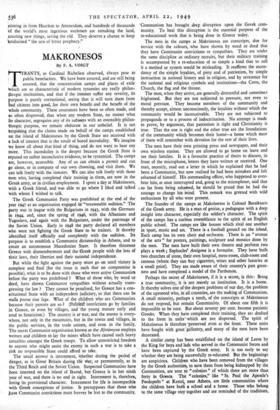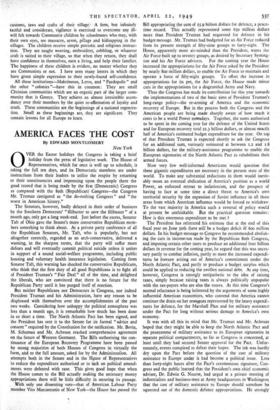MAKRONESOS
By F. A. VOIGT YRANTS, as Cardinal Richelieu observed, always pose as public benefactors. We have been assured, and are still being assured, that the concentration camps and places of exile 'which are so characteristic of modern tyrannies are really philan- thropic institutions, and that if the inmates suffer any severity, its purpose is purely correctional, seeing that it will turn them from bad citizens into good, for their own benefit and the benefit of the whole community. These assurances have been so often made, and so often disproved, that when any modern State, no matter what its character, segregates any of its subjects with an ostensibly philan- thropic purpose, we remain obdurate in our unbelief. It is not turprising that the claims made on behalf of the camps established on the island of Makronesos by the Greek State are received with a lack of interest that is the result of bored incredulity. We imagine we know all about that kind of thing, and do not want to hear any more. This incredulity is the deeper because the Greek State is reputed on rather inconclusive evidence, to be tyrannical. The camps are, however, accessible. Any of us can obtain a permit and can go alone, or in company of our own choosing, and visit them. We can talk freely with the inmates. We can also talk freely with those men who, having completed their training in them, are now in the Greek army, or in civilian employment. I spent a day at Makronesos, with a Greek friend, and was able to go where I liked and talked with whom I wished to talk.
The Greek Communist Party was prohibited at the end of the year 5947 as an organisation engaged in "'treasonable sedition." The party was in league with the Bulgarians in 1943, with the Germans in 1944, and, since the spring of 1946, with the Albanians and Yugoslays, and again with the Bulgarians, under the patronage of the Soviet Union. Early in 1948 the party declared all members who were not fighting the Greek State to be traitors. It thereby identified itself officially and completely with the sedition. Its purpose is to establish a Communist dictatorship in Athens, and to create an autonomous Macedonian State. It therefore threatens Greece with dismemberment and the Greek people with the loss of their laws, their liberties and their national independence.
But while the fight against the party must go on until victory is complete and final (for the issue is such that no compromise is possible), what is to be done with those who were active Communists before the party was prohibited ? What of those who, by word or deed, have shown Communist sympathies without actually trans- gressing the law ? They cannot be penalised, for Greece has a con- stitutional State with an independent judiciary, so that there can be nulla poena sine lege. What of the children who are Communists because their parents are so ? (Politiezd convictions go by families in Greece, or even by villages, and the young mature early and tend to fanaticism.) The country is at war, and the enemy is every- where, not only in the mountains, but in the towns and villages, in the public services, in the trade unions, and even in the family. The secret Communist organisation known as the Aftodmyna employs women and children to lay the mines which have caused such heavy casualties amongst the Greek troops. To allow unrestricted freedom to anyone who might assist the enemy in such a war is to take a risk no responsible State could afford to take.
The usual answer is internment, whether during the period of danger, as in Great Britain during the war, or permanently, as in the Third Reich and the Soviet Union. Suspected Communists have been interned on the island of Ikarne, but Greece is in her ninth year of war, and there is no end in sight. Internment is, therefore, losing its provisional character. Internment for life is incompatible with Greek conceptions of justice. It presupposes that those who have Communist convictions must forever be lost to the community. 'Communism has brought deep disruption upon the Greek com- munity. To heal this disruption is the essential purpose of the re-educational work that is being done in Greece today.
The men in the camps at Makr6nesos are conscripts, due for service with the colours, who have shown by word or deed that they have Communist convictions or sympathies. They are under the same discipline as ordinary recruits, but their military training is accompanied by a re-education of so simple a kind that to call it a method or system would be misleading. It reaffirms the ascen- dancy of the simple loyalties, of piety and of patriotism, by simple instruction in national history and in religion, and by reverence for the national and religious symbols and institutions—the Cross, the Church, the flag and the throne.
The men, when they arrive, are generally distrustful and sometimes frightened. But they are not subjected to pressure, not even to moral pressure. They become members of the community and thereby accept, almost unconsciously, the loyalties without which the community would be inconceivable. They are not subjected to propaganda or to a process of indoctrination. No attempt is made to prove, by argument, that patriotism is right and Christianity is true. That the one is right and the other true are the foundations of the community which becomes their home—a home which most of them will remember with devotion for the rest of their lives.
The men have their own printing press and newspaper, and their own wireless station. They are allowed to go home on leave and see their families. It is a favourite practice of theirs to discuss, in front of the microphone, letters they have written or received. One man, recently, read out a letter in which he explained that he had been a Communist, but now realised he had been mistaken and felt ashamed of himself. His commanding officer, who happened to over- hear him, at once interrupted and, going to the microphone, said that so far from being ashamed, he should be proud that he had the courage to change his mind. This remark was greeted with wild enthusiasm by all who were present.
The founder of the camps at Makronesos is Colonel Baraiktaris of the Greek army. He is a man of genius, a pedagogue with a deep insight into character, especially the soldier's character. The spirit of the camps has a curious resemblance to the spirit of an English public school. The camps are like houses which rival one another in sport, music and art. There is a football ground on the island.
Each camp has its own choir and orchestra. There is an " avenue of the arts " for posters, paintings, sculpture and mosaics done by the men. The men have built their own theatre and perform two plays a week ; Sophocles' Antigone is a favourite. They have built two churches of stone, their own hospital, mess-room, club-room and canteen (where they can -buy cigarettes, wines and other luxuries at a small price). They are made aware of their country's past great- ness and have completed a model of the Parthenon.
Perhaps the secret of Makronesos, if it is a secret, is this: Being a true community, it is not merely an institution. It is a home.
It thereby solves one of the deepest problems of our day, the problem of the uprooted who, in all countries, are the making of Communism.
A small minority, perhaps a tenth, of the conscripts at Makronesos do not respond, but remain Communists. Of about one fifth it is impossible to be sure. But about seventy per cent. become patriotic Greeks. When they have completed their training, they ar.-: drafted to the front in units' which are not dispersed. The spirit of Makr6nesos is therefore 'preserved even at the front. These units have fought with great gallantry, and many of the men have been decorated.
A similar .camp has been established on the island of Leros by the King for boys and lads who served in the Communist forces and have been captured by the Greek army. It is too early to say whether they are being successfully re-educated. But the beginnings are auspicious. Children who have been removed from the villages by the Greek authorities, to save them from being kidnapped by the Communists, are sent to "colonies" of which there are more than
forty in Greece. The "colonies," like " St. Paul the Apostle's Paedopolis " at Kastrii near Athens, are little communities where the children have both a school and a home. Those who belong to the same village stay together and are reminded of the traditions,
customs, laws and crafts of their village.- A firm, but infinitely tactful and considerate, vigilance is exercised to overcome any ill- will felt towards Communist children by schoolmates who may, with their own eyes, see massacre, arson, pillage and kidnapping in the villages. The children receive simple patriotic and religious instruc- tion. They are taught weaving, embroidery, cobbling, or whatever craft is suited to their village, so that when they return, they shall have confidence in themselves, earn a living, and help their families. The happiness of these children is evident, no matter whether they are Communists or not. I have seen many letters in which they have given simple expression to their newly-found self-confidence.
All these institutions—Malu-onesos, Leros, and " Paedopolis " and the other " colonies "—have this in common: They are small Christian communities which are an organic part of the larger com- munity that is Greece. They achieve an almost irresistible ascen- dancy over their members by the quiet re-affirmation of loyalty and truth. These communities are the beginnings of a national regenera- tion. Small as these beginnings are, they are significant. They contain lessons for all Europe to learn.



































 Previous page
Previous page